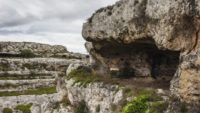By Ken Ham “Who do you say that I am?” That question Jesus asked Peter in Matthew 16:15 is the most important question anyone can answer. And from cover to cover, the Bible answers that question with the truth that Jesus Christ is the eternal God and the Creator, who became a man to die on the cross in our place. But a biblical Christology (the doctrine of the person of Jesus), like so many other essential doctrines, is slipping from our churches. Such a belief has been condemned as heresy by the church for centuries because it runs contrary [More]
August is an important month for sunflowers—those gigantic, bright-yellow flowers with brownish, round seed heads bordered by radiating yellow ligules (petal-like rays) that resemble a shining, summer sun.1,2,3 A recent report in the Chesapeake Bay Journal details some of the humble sunflower’s splendor, and those details should remind us that God’s bioengineering genius is boundless.1 More… …read more Source: icr.org
By Ken Ham Every year, hordes of tourists descend on Grand Canyon to enjoy the natural beauty of this geological wonder. But many tourists hiking the popular Bright Angel Trail missed something very interesting—a series of fossilized footprints preserved in a boulder, lying next to the trail, that had broken off a cliff in the nearby Manakacha Formation. But in 2016, a geology professor hiking with his students noticed the footprints, and now research on these tracks has been released. One of the scientists who studied these tracks, Stephen Rowland, shares: These are by far the oldest vertebrate tracks in [More]
By Ken Ham A jaw-dropping 89.1%* of doctors in Belgium support the intentional killing of infants with disabilities after they have been born (i.e., an “after-birth abortion”), according to a recent study. When asked, almost 9 in 10 Belgian doctors working with unborn children agreed that “in the event of a serious (non-lethal) neonatal condition, administering drugs with the explicit intention to end neonatal life is acceptable.” Now, what constitutes a “serious (non-lethal) neonatal condition” was not spelled out in the study. It’s truly a culture of death! As shocking and horrifying as this may seem, it is the next [More]
A Civic Biology was the centerpiece of the 1925 Scopes Monkey Trial. It is high time to review what was in that textbook. …read more Source: creation.com
By Simon Turpin How would first-century Jewish people have viewed the ending of the Old Testament (Hebrew Scriptures)? Did they think it was a complete account? …read more Source: AIG Daily
By Ken Ham Though music sets a tone for worship, God’s Word should be the main focus in our church services. …read more Source: AIG Daily
By Sarah Chaffee On this episode of ID the Future, we bring you the second half of John West’s documentary The Magician’s Twin: C. S. Lewis and the Case Against Scientism. Lewis wrote with great concern about scientism’s totalitarian potential, but never more prophetically than in That Hideous Strength, published 75 years ago this month, in which scientists forget the limits of their discipline, cast off ethical restraints, and assume control of public policy. According to Lewis, science steps dangerously outside its bounds when it assumes it has all knowledge, especially moral knowledge. Your browser does not support playing Audio, [More]
By John G. West On this episode of ID the Future, we recognize the 75th anniversary this month of the publication of C. S. Lewis’s prophetic science fiction novel That Hideous Strength, with the first slightly abridged part of John West’s documentary The Magician’s Twin: C. S. Lewis and the Case Against Scientism. Several scholars were interviewed for the film, including Jay Richards, Angus Menuge, Victor Reppert, John West, and Michael Aeschliman. Scientism is the idea that science is the ultimate path to knowledge and wisdom — the only sure path — and that the spiritual realm is a mirage. [More]
By Ken Ham On March 14, 2020, our friends at Sight & Sound Theatres were set to premiere a brand-new show three years in the making—Queen Esther. Based on pre-sales, over 800,000 people were expected to watch this show over its premiere season. Of course, we all know what happened in March. Sadly, Queen Esther missed its debut. But this incredible show is back on and not only can you go and see it in person in Lancaster, PA (Noah is showing in Branson, MO), but you can enjoy this spectacular live show from your own home this Labor Day [More]
If humans evolved from animals, ‘sin’ predates Adam by millennia, undermining the case for moral imperatives and restraints on human behaviour today. …read more Source: creation.com
By Dr. Elizabeth Mitchell Neanderthal architectural preferences, like hot water, organized living spaces, and warm bedrooms, add to our growing understanding that Neanderthals were human. …read more Source: AIG Daily
A high-tech virtual reality experience called the “Truth Traveler” has just opened at the Ark Encounter, featuring its first VR show, A Flood of Reality. …read more Source: AIG Daily
By Perry McDorman Living jewels of dazzling beauty inhabit the rainforests of Central and South America. …read more Source: AIG Daily
Why it all depends on what is meant by ‘age’. …read more Source: creation.com
By Ken Ham We’re very excited that the World’s Largest Christian Music Festival is coming to the Ark Encounter next year, August 2 – September 10, 2021, south of Cincinnati. In a partnership with Abraham Productions, we’re bringing over 80 well-known Gospel music artists and groups to the Ark Encounter to perform over 40 days and nights in our 2,500-seat Answers Center. Here are just a few of the artists that will be performing during “40 Days and 40 Nights of Gospel Music at the Ark”: The Hoppers The Isaacs Lynda Randle Booth Brothers Karen Peck and New River Ernie [More]
By Dr. Danny R. Faulkner What is geocentric theory and a brief history, arguments for/against, how it relates to the flat earth movement & what the Bible says about geocentrism. …read more Source: AIG Daily
Portions of the genome thought to have no purpose-disparagingly named ‘junk DNA ‘-are now known to contain patterns suggesting instead an important functional role. …read more Source: creation.com
By Ken Ham Each year we host Deaf Days, which include one day at the Ark Encounter and one day at the Creation Museum in N. Kentucky. Deaf guests can see the Bible come to life as they tour the three decks of exhibits in the life-size Ark and walk through biblical history at the Creation Museum. They’ll also enjoy ASL presentations and more, Saturday, October 10, 2020, at the Ark Encounter in Williamstown and Sunday, October 11, 2020, at the Creation Museum in Petersburg. On Deaf Days, Deaf volunteers and interpreters will be available to assist guests throughout the [More]
The 1925 Scopes Monkey Trial pitted evolution and creation against each other in the courtroom. …read more Source: creation.com
This summer, the Hubble Space Telescope took a brilliant new photograph of Saturn and its rings.1 Saturn’s moons Mimas and Enceladus can also be seen in the photo. For a number of years now, the Hubble Space Telescope has been taking yearly photographs of Saturn at about the time that Earth is closest to the planet, about 840 million miles away. This is part of an effort to obtain a sequence of images in order to study the atmosp… More… …read more Source: icr.org
By Ken Ham “Love has no age.” That phrase, along with three “partying face” emojis and a photo of an individual dressed in a rainbow suit and matching umbrella, was recently tweeted from the Drag Queen Story Hour UK Twitter account, according to screenshots captured before the tweet was reportedly deleted and the account locked. “Love has no age”—now what does that mean? Well, considering that Drag Queen Story Hours are directed at children and encouraging them to accept others “no matter how different they are,” it would seem that the phrase means exactly what you’d think it means: pedophilia [More]
By Ken Ham The Bible records an incredible miracle where God split the Red Sea in two, leading the Israelite nation to freedom and drowning their Egyptian oppressors. Did this event really happen? Was it a spectacular miracle or the result of natural forces on a shallow lake or marsh? Filmmaker Tim Mahoney dives deep into these questions in the epic conclusion to The Red Sea Miracle in part two of the You can find The Red Sea Miracle: Part II at AnswersBookstore.com or you can rent or buy the film (as well as others in the Patterns of Evidence [More]
Why is historical science less trustworthy than operational science? Important question-let’s find out! …read more Source: creation.com
By Howard Glicksman On this episode of ID the Future, physician Howard Glicksman explains the hugely complex blood flow systems required to keep us clear-headed and alive even while doing everything from gymnastics to simply getting up in the morning. There are various methods the heart and blood vessels use to keep the body properly supplied. It’s also about hormones and nervous-system signaling. Does Darwinism provide a satisfactory explanation for such an intricately coordinated system? Dr. Glicksman argues that it does not, and that a far better explanation is intelligent design. Your browser does not support playing Audio, please upgrade [More]
By Ken Ham Most Fridays and Saturdays at the Ark Encounter this summer, my good friend Buddy Davis and I put on a special kids’ program for families—for “kids of all ages,” as we say. Buddy sings, I speak on dinosaurs, the gospel, and more, and then Buddy and I joke around with each other. Kids, teens, and their parents love it (and with space for 2,500 people in the Answers Center, there’s plenty of room for social distancing). Kids love Buddy’s laid-back style of presenting biblical truth and singing. And you can now enjoy teaching from Buddy on Answers [More]
By Ken Ham Our world is hurting. Coronavirus fears, record unemployment, anxiety about the future, and more seem to be driving a spike in “adverse mental health conditions, substance use, and suicidal ideation,” according to a new study of American adults from the Centers for Disease Control (CDC). Reportedly, 25.5% of Americans, ages 18-24, “seriously considered suicide” in June and 74.9% “reported having at least one mental or behavioral health condition during June.” The only ultimate answer is the eternal hope, peace, and joy that comes through the gospel of Jesus Christ and believing the Word of God. What is [More]











































